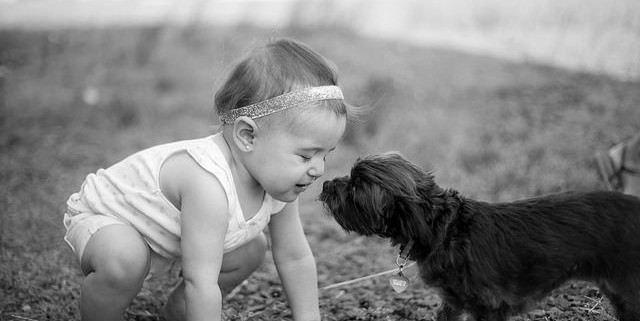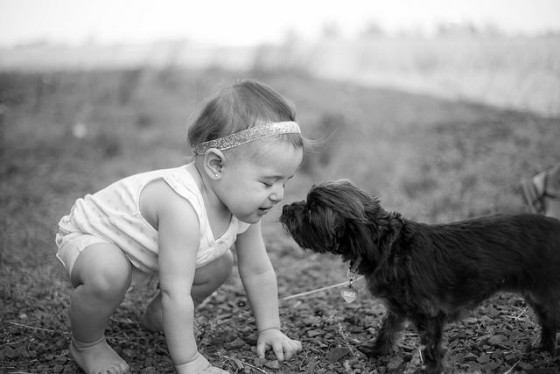Immune System Boost for Baby? Get a Dog
Last updated March 31, 2017.
You’ve heard it before — dogs are man’s best friend. We love our pets and they’re an important part of our lives, but many families worry about the health and safety of their children around their pets. Pets, after all, can track in dirt and allergens and expose your little one to them. But a recent study found that babies with dogs may be less prone to infection than babies in pet-free homes.
Contents
Babies and Dogs: Respiratory Infections
Dogs aren’t the cleanest of roommates — their fur traps dirt, dust, and other bits and pieces. They walk around outside and track that into your home. They lick themselves and other dogs and then lick you, or your little one. It seems like that might put your baby at risk for infections or allergies, but a group of Finnish researchers studying children and pets found that the opposite may be true.
They studied several hundred families and found that children that grew up with a dog in the home were 30% less likely to catch respiratory infections than their pet-free counterparts. Respiratory infections — colds, coughs, wheezing, and congestion, for example — are extremely common in babies. Many children suffer from 5 or 6 every year, until growing out of it around the age of 5.
Most of the time, these infections aren’t serious and go away on their on. However, respiratory infections are the top cause of death for children under the age of 5.
So what’s the link between dogs and a decreased risk of respiratory infections? The study found the strongest disease resistance in children whose dogs spent 6 hours a day or fewer inside the home. So, they speculate, the benefits may stem from exposure to the dirt, dust, and other contaminants that dogs track in from outside the home. That exposure may help the formation of the immune system, making it more able to fend off infections.
See also: Can We Prevent Food Allergies in Our Babies?
Babies and Dogs: Ear Infections
A decreased risk of respiratory infections wasn’t the only benefit, either. Babies with dogs also had a 44% lower chance of developing ear infections, another common early childhood ailment.
After the common cold, ear infections are the second-most common illness in children in the US. Many ear infections go away on their own, but some require treatment with antibiotics. Ear infections that don’t go away can lead to hearing loss and permanent damage to the eardrum, so you should contact your doctor immediately if you notice any signs of an ear infection.
The explanation for the decreased risk in babies with dogs is likely the same as the explanation for the decreased risk of respiratory infection — dogs bring in lots of dust and dirt from outside and those help build up your little one’s immune system.
Babies and Dogs: Antibiotic Use
In addition to the decreased risk of respiratory and ear infections in infants, the study found that babies with dogs were about 30% less likely to have used antibiotics in the past year than the children without dogs. This is related to the lower rates of respiratory and ear infections, but has its own health benefits. Doctors try to avoid giving out antibiotics where possible because overuse of the drugs can put children at risk for antibiotic-resistant infections, which are much more dangerous and much harder to treat.
What about cats?
Cat lovers, don’t despair. The Finnish study found that cats also are associated with a decreased risk of respiratory and ear infections and antibiotic use. However, the effects are much less pronounced than with a dog. That may be because many cats remain indoors and don’t track the same kinds of outdoor dirt and dust that dogs do into the home.
Should we get a dog to improve baby’s immune system?
Before you run to your local shelter to pick up a puppy, you should also consider whether your child has allergies or asthma. If your little one has either of those conditions, having a dog can actually make those conditions worse. In addition, the health benefits of having a dog require exposure during very early infancy — the first year of life. Getting a dog later than that won’t have as strong an effect on your baby’s immune system.
The immune system is particularly complicated and not well-understood, and getting a dog is not guaranteed to make your little one healthier. Pets also come with their own risks. Children are particularly at risk for dog bites, for example, and dogs and cats can carry infections like toxoplasmosis. Puppies and kittens are more likely to transmit these diseases, since they don’t have all their shots, so you may consider getting an older animal to decrease that particular risk.
In other words, it’s up to you! If your child doesn’t have allergies or asthma, getting a dog may help strengthen your baby’s immune system. Plus, your family will get the benefit of a loving companion. If your child has allergies or asthma or if you don’t want to have pets in the home, that’s also fine! There are plenty of ways to strengthen your baby’s immune system — playing outside will likely give your child much the same exposure as having a dog would.
Did you decide to get a dog or cat while you were pregnant or had a baby? Tell us about it in the comments!
Image Credit and License









FIRST REPLY!!! This is really cool! And informational thanks!